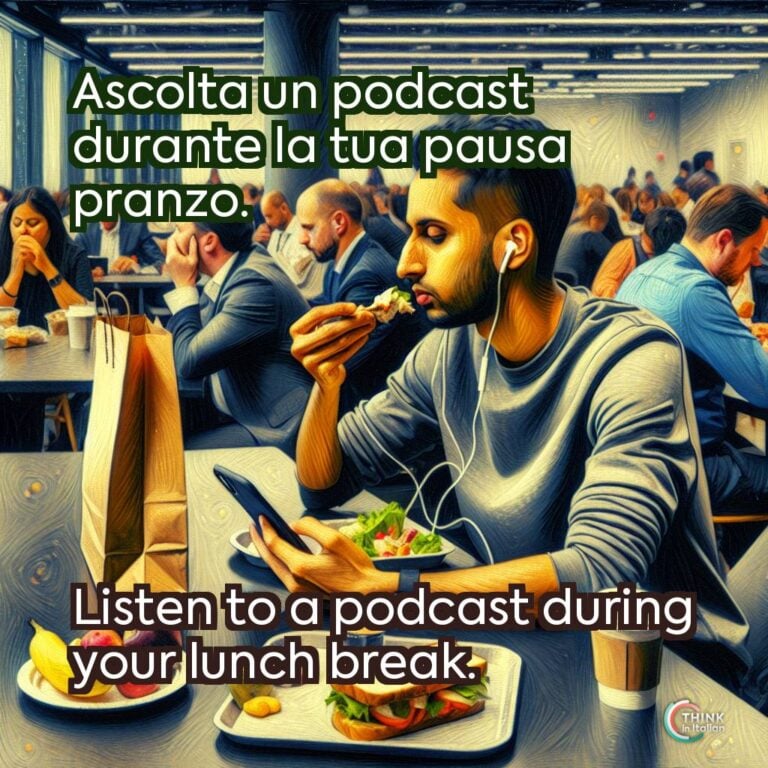Learn Italian Through Podcasts
If you are a podcast lover like me, including podcasts in your Italian learning journey is the right thing to do.
Learning Italian through podcasts offers a unique blend of flexibility, engagement, and immersive language exposure.
With the right podcasts, you can improve your listening skills, build your vocabulary, and get a deeper understanding of Italian culture, all on your own schedule.
In this guide I will give you essential information and strategies to make the most of Italian podcasts for your Italian language journey.
Why Learn Italian Through Podcasts?
Convenience and Flexibility
The best aspect of podcasts, in general, is that you can listen to them anywhere and anytime. This flexibility allows you to incorporate Italian into your daily routine.
You can download episodes on your smartphone and listen during commutes, workouts, or errands, turning everyday activities into learning opportunities.
Integrating language learning into your daily routine will provide you with a boost in motivation and consistency. This happens because you will link a daily action to learning Italian, and you will not do without it.
Another good aspect is that most apps, like Spotify, Google Podcasts, or Overcast, let you adjust speed and replay segments.
This way, you can slow down challenging sections to master difficult vocabulary, then switch to regular speed to enhance natural fluency.
Authentic Language Input
Podcasts immerse you in Italian pronunciation, intonation, and conversational rhythm. This exposure is invaluable to pick up natural pauses, emphasis, and the “melody” of Italian speech.
Start with slower-paced podcasts, like “News in Slow Italian“, to gradually adjust to native-level speed.
Many Italian podcasts cover interesting themes like travel, culture, or the Italian daily life, helping you expand vocabulary in specific contexts.
Diverse Learning Content
The best thing about podcasts is that there is one for every proficiency level. Choose a podcast that matches your level, then switch as you advance.
If you are a beginner, you can start with podcasts which cover basic grammar and vocabulary. If you are an intermediate, try more natural conversations that expose you to everyday Italian expressions and real-life situations.
If you are an advanced, dive into podcasts that feature fast-paced, native-level Italian. They often tackle complex topics, like current events, Italian politics, philosophy, or literature, which will challenge your vocabulary and comprehension.
Advanced podcasts can also expose you to idiomatic expressions, regional accents, and intricate sentence structures, pushing your skills to new heights.
Podcasts also mix different formats, including interviews, storytelling, and news. This variety reinforces learning by exposing you to Italian through multiple contexts.
How to Learn Italian Through Podcasts
Choosing the Right Podcast
- Set clear goals: decide if you want to focus on conversational skills, grammar, or cultural knowledge.
- Preview before committing: listen to sample episodes and read reviews to find a podcast that fits your style. Make sure the host’s teaching style resonates with you, as this will keep you motivated and engaged in consistent learning.
Creating a Learning Plan
It is very subjective, but I can recommend what works for me, which is setting a regular listening routine. For example, you might listen on Monday, review vocabulary on Wednesday, and practice speaking on Friday.
This spaced approach helps you retain information and build a steady learning rhythm.
Active Listening for Maximum Benefit
Podcasts are an example of passive learning, not as much as learning while you sleep, but you don’t do much. To turn passive listening into an active exercise, write down key phrases, vocabulary, or grammar points as you listen.
After each episode, recap what you learned in Italian. Summarizing helps reinforce memory and gives you a chance to practice speaking or writing in your own words.
Practice Speaking and Writing
Another way to make listening podcast an active exercise is repeating after the podcast host. This is a great way to improve your pronunciation and memory retention.
You could also keep a vocabulary journal and write a sentence using each word. For feedback, consider posting on language exchange sites where native speakers can help correct mistakes.
Stay Motivated and Consistent
From a mere psychological point of view, celebrate small wins. It is important that you recognize milestones, like completing a podcast series or understanding an entire conversation without pauses.
Celebrating these achievements keeps motivation high and reminds you of your progress.
Also, diversify your Italian content to keep things interesting. Listen to Italian music, watch Italian movies, or follow Italian influencers to surround yourself with Italian language and culture.
Recommended Podcasts for Learning Italian
Here are some podcast I recommend that are tailored to skill levels and interests:
- Beginners
- Coffee Break Italian
- Learn Italian with Lucrezia
- Intermediate
- News in Slow Italian
- Italiano Automatico
- Advanced
- One World Italiano
- Parliamo Italiano
- The Essential
Each offers a unique approach, whether through structured lessons, slow news reporting, or real-world conversational content. Try a mix to discover which best suits your goals.






